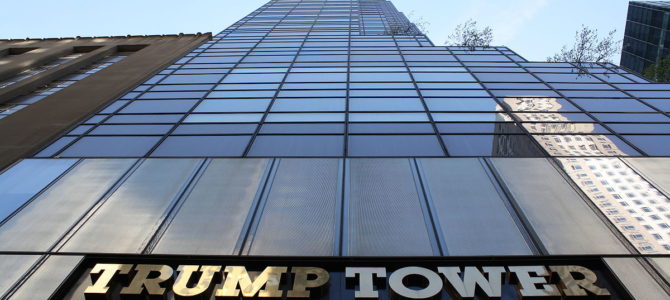
Late Thursday, CNN reported that, according to “sources with knowledge,” President Donald Trump’s former personal attorney, Michael Cohen, planned to reveal to Special Counsel Robert Mueller that Trump knew in advance of his son’s June 2016 meeting in Trump Tower with Russians who promised “dirt” on Hillary Clinton.
Donald Trump Jr. has admitted that he agreed to the June 9, 2016, Trump Tower meeting with several purportedly highly connected Russians after publicist Rob Goldstone said they had “very interesting” information “that would incriminate Hillary.” But a Senate Judiciary Committee hearing confirmed the younger Trump’s claim that the meeting was a bust and the Russians had no such “dirt” on the Democratic candidate.
Rather, as CBS News reported when the Senate Judiciary Committee released transcripts two months ago of the oversight hearing, “while the June 9, 2016 Trump Tower meeting was initially intended to provide opposition, research concerning then Democratic Presidential Candidate Hillary Clinton, the meeting turned out to primarily be about the Magnitsky Act and certain laws concerning the adoption of Russian children by U.S. citizens. This account is supported by five of the attendees who testified live before the committee—Donald Trump Jr., Rob Goldstone, Rinat Akhmetshin, Irakly Kaveladze and Anatoli Samochornov—and two more of the attendees, Natalia Veselnitskaya and Jared Kushner, who submitted written accounts of the meeting to the Committee—all of whom the Democrats now say ‘testified to a relatively consistent narrative.’”
Trump Jr. also told the Senate Judiciary Committee that, prior to the June 9 meeting, he had only told Jared Kushner and Paul Manafort of the meeting and offer to provide information on Hillary. Trump Jr. further testified that after the meeting he did not discuss it with anyone until news of the Russian rendezvous broke in the summer of 2017.
President Trump likewise denied knowing about the meeting until the media began reporting the story more than a year later. CNN claimed, however, that Cohen was prepared to tell Mueller that “he was present, along with several others, when Trump was informed of the Russians’ offer by Trump Jr.,” and that “Trump approved going ahead with the meeting.”
Rep. Adam Schiff (D-CA), the ranking Democrat on the House judiciary, oversight, and intelligence committees, was one of the first to react to the CNN report, tweeting two commentaries. Both show that Schiff either doesn’t know what he is talking about regarding the Russian collusion investigation, or doesn’t care to know.
Schiff’s First Whiff
First, Schiff suggested that if Trump had approved the June 9, 2016, meeting, “he not only publicly appealed to Russia for help, but privately approved receiving it,” adding “[a]s forecast to Papadopoulos, that help would come in the release of Clinton emails.” “The conspiracy case may have just gotten stronger,” Schiff ended.

Papadopoulos, of course, refers to former Trump campaign advisor George Papadopoulos. Papadopoulos pleaded guilty in October 2017 to lying to the FBI. In his statement of offense Papadopoulos maintained that in April 2016, the now-missing Maltese professor Joseph Mifsud claimed the Russians had “dirt” on Clinton. Papadopoulos described the “dirt” as “emails of Clinton.”
The Russians, however, never released Clinton’s emails. Rather, according to Mueller’s latest indictment, the Russians attempted to interfere in the 2016 presidential election by hacking and releasing emails from the Democratic National Committee. Papadopoulos denied any knowledge of the DNC hack and claims he understood the emails Mifsud mentioned to be the emails Clinton supposedly deleted from her home-brew server, which remain missing.
Also, other than mentioning the “dirt” on Hillary over drinks with an Australian diplomat in London, there has been no claim that Papadopoulos sought the emails or spoke with anyone on the Trump campaign about Mifsud’s claim that Russia had emails. As the author of the Democratic response to Rep. Devin Nunes’ majority memo on FISA abuse, Schiff should know this. But the general public does not.
So, Schiff uses Cohen’s reported claim—that Trump knew about the Trump Tower meeting to get “dirt” on Hillary—to reopen the Russia collusion narrative. He does so by conflating the DNC emails hack, which forms the basis of the recent special counsel indictment, with the missing Clinton emails, even though the two are unrelated.
Schiff Whiff Number Two
Schiff’s second tweet proved equally deceptive. In Dick-and-Jane simplicity, Schiff laid out a chronology for collusion, beginning with: “The Russians offered Trump help.” As the second step in his syllogism, Schiff assumes Trump knew about the June 9 meeting and “approved getting Russian help.”
Then the fatal leap: “The Russians delivered help.” But the help the Russians delivered—in the form of the DNC hacked emails—had nothing to do with the offer presented to Trump Jr. Again, however, the general public doesn’t follow the minutia, making Schiff’s string seem convincing.

But it is not. Even if Trump knew about the meeting beforehand—something I highly doubt because Trump Jr. wouldn’t be foolish enough to risk a perjury charge if Cohen and others were present when he told his father about the meeting—there was no indication the meeting would involve information illegally obtained, as with the hacked emails. Rather, the email Goldstone sent Trump Jr. to sell the meeting claimed that a Crown prosecutor of Russia offered “some official documents and information that would incriminate Hillary in her dealings with Russia.”
Here, then, is Schiff’s bigger mistake: He could have used the latest news about the Trump Tower meeting to chastise the commander-in-chief for (reportedly) approving of his son obtaining opposition research from Russians when the Russians sought to attack our democracy. Of course, that charge would equally condemn Hillary, who used retired British spy Christopher Steele to do the same thing.
Instead, Schiff overplayed the story, claiming it made the Russian conspiracy case stronger. While that charge has a surface appeal, it won’t withstand scrutiny. Instead it merely serves as further fodder for Trump’s fake news rejoinder—and rightly so.








